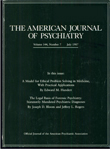Durable power of attorney and informed consent with Alzheimer's disease patients: a clinical study
Abstract
OBJECTIVE: Experience with a new surrogate consent system for patients with Alzheimer's disease is reviewed. It was hypothesized that as patients' cognitive status deteriorated, surrogate consent through a durable power of attorney would become necessary to facilitate continued involvement in clinical research. METHOD: The authors retrospectively reviewed the charts of inpatients with Alzheimer's disease who participated in research between January 1989 and December 1994 at the Geriatric Psychiatry Unit of the National Institute of Mental Health. Seventy-nine patients were included. The main outcome measures were the Clinical Dementia Rating, Global Deterioration Scale for primary degenerative dementia, and Mini-Mental State. RESULTS: Most patients were in the mild-to-moderate stage of the illness when they chose to participate in research and assign a durable power of attorney (96% scored 2 or less on the Clinical Dementia Rating, and 92% scored 5 or less on the Global Deterioration Scale). On average, the subjects participated in 3.8 (SD = 2.6) studies. For 35 patients with multiple admissions over this period (average = 3.1 years), scores on the Clinical Dementia Rating and Global Deterioration Scale declined by 1.0 and 1.5 points, respectively. CONCLUSIONS: The durable power of attorney allows research participation for subjects with Alzheimer's disease at all stages. The linchpin is assignment of a durable power of attorney in the early-to-moderate stage of Alzheimer's disease, before subjects lose the capacity to give informed consent. This approach could also be adapted to patients with cognitive decline due to other debilitating diseases.



